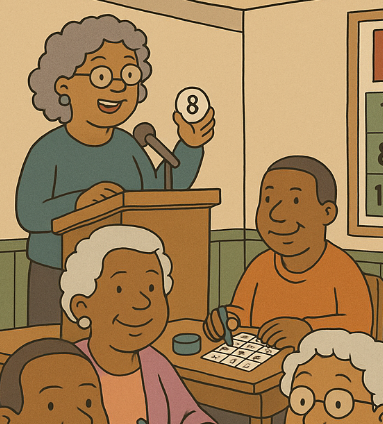
What Happens When Seniors Start Gambling More Often?
For another project, we’ve been talking to older adults in community senior centers. The prevalence and diversity of gambling got us thinking, which led to this blog.
So, the leading question is this: what if the safest place your mom or grandmother feels she can go… is also where she’s most at risk?
Older adults around the world are increasingly visiting casinos, bingo halls, and online gambling sites. They are pursuing more than just jackpots; they are looking for community, excitement, and an escape from loneliness. However, beneath the vibrant lights and cheerful atmosphere, there is a growing and often overlooked public health issue: gambling-related harm among older adults.
And here’s the kicker: it’s not just about addiction.
A Public Health Problem Hiding in Plain Sight
Recent research shows that gambling among older adults is widespread and growing. One review found that up to 85.6% of older adults have gambled in the past year. But most studies and interventions still focus on young men or traditional “problem gamblers.”
This blind spot is dangerous.
A comprehensive scoping review and multiple international studies reveal that older adults face unique, layered risks that go far beyond personal choice or lack of self-control. The harms they face aren’t just individual. They’re structural, social, and commercial.
Why Do Seniors Gamble So Much? It’s Not Just the Thrill
Many older adults aren’t gambling for the jackpot—they’re gambling to fill a void.
- After retirement, days stretch long and social circles shrink.
- Widowhood, declining health, and mobility issues can leave people isolated and depressed.
- Casinos offer free coffee, cheap meals, bright lights, and friendly faces—more than most senior centers ever do.
As one study noted, gambling becomes “a form of active aging”—a place where older adults feel autonomous, stimulated, and safe.
But this illusion of safety masks real risk.
The 4 Hidden Drivers of Gambling Harm in Older Adults
1. Life Transitions Create Vulnerabilities
Grief, loss of identity post-retirement, chronic pain, or physical limitations can all push someone toward gambling as a coping tool. One qualitative study identified three paths to late-life gambling harm: unresolved grief, ingrained habits, and dormant impulsivity that reawakens in older age.
2. Industry Marketing Targets Seniors
Casinos and online gambling sites aggressively market to older adults: free bus rides, seniors’ buffets, even coupon incentives for medication or groceries. For many low-income elders, this feels like support, but it’s really a trap.
3. Social Isolation and Limited Recreation Options
When bingo night is the only social event all week, skipping it feels like skipping life itself. Some retirement homes even encourage group gambling as a bonding activity, unintentionally exposing residents to risk.
4. Cognitive Distortions and Declining Inhibition
Older adults are more likely to believe in “luck,” fall for “near misses,” and think they’re due for a win. When combined with age-related changes in the brain, this can create a dangerous cocktail of poor decision-making and emotional vulnerability.
But Is It Really That Harmful?

Yes—and often in quiet, devastating ways.
Problem gambling among older adults is linked to:
- Increased depression and suicidal ideation
- Unmanageable debt with no time to recover
- Declining physical health due to sedentary behavior
- Worsening social isolation as relationships suffer
One Canadian study found that 30.8% of older problem gamblers had played bingo in the last year, highlighting that even so-called “safe” games carry risk.
And unlike younger adults, seniors have fewer financial and social resources to bounce back from losses. A $500 mistake at 30 is a lesson. At 75, it could mean no groceries next month.
What Should Public Health Do About It?
So far, public health responses have mostly focused on “responsible gambling” messages, like setting spending limits or recognizing addiction signs. But these messages target individual behavior, not the environments or systems that fuel harm.
Experts now call for a broader strategy:
- Regulate predatory marketing aimed at older adults.
- Expand access to non-gambling social activities, especially in retirement communities.
- Train healthcare providers to recognize gambling harm in aging patients.
- Fund culturally sensitive, age-appropriate prevention campaigns.
And importantly: stop treating bingo as harmless fun.
A Society’s Mirror
Gambling halls can feel like welcoming refuges for older adults, but they also reflect a society that’s failed to create better options.
When social connection, purpose, and mobility fade, what fills the void?
If the answer is gambling, we have to ask: what else could, or should, be there?
What’s Next?
More research is needed, especially on the commercial and environmental factors that lead older adults into gambling traps. Public health has an urgent role to play in reframing gambling as a systems-level issue, not just a personal failing.
The next step isn’t just telling older adults to stop gambling—it’s offering them something better to start.
Join the Conversation
- Have you seen gambling promoted as entertainment in senior communities?
- What non-gambling activities could replace that sense of excitement or connection?
- Should casinos be held accountable for marketing to vulnerable elders?
Let’s hear from you. How would this apply in your community?
Don’t Let Science Pass You By
⚠️ Public health breakthroughs and threats are happening fast.
Missing one update could mean missing the chance to act, advocate, or lead. Stay sharp, stay informed—with our weekly science brief, trusted by changemakers.✅ Subscribe now—it’s free and essential.
📣 Share this blog to grow the circle of informed action.



